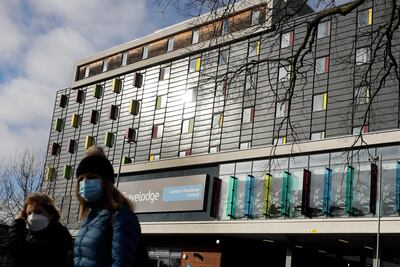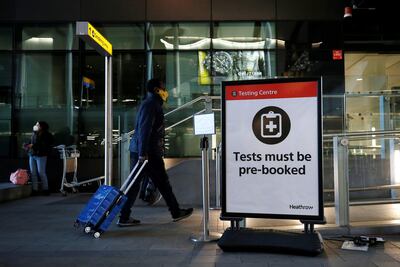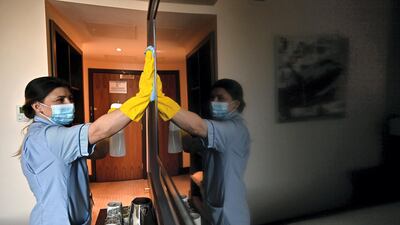The UK’s new border restrictions come into force on Monday, with travellers facing hefty fines and even a jail term if they do not follow the rules.
Passengers arriving from a so-called red list of 33 countries – which includes the UAE, South Africa and all of South America – have to book and stay in managed quarantine for 10 days.
All other travellers must book a travel test package and isolate for 10 days at home.
How do you book a place in hotel quarantine and how much will it cost?
If staying in a quarantine hotel, you must book a quarantine package with the government before you complete the passenger locator form.
The package costs £1,750 ($2,420) for a single adult, an additional £650 for each extra adult and £325 per child. Bookings can be made on the government portal, which crashed shortly before going live on Thursday. It is now available here.
The package includes the costs of transport from the port of arrival to the designated hotel, food, accommodation, security, other essential services and testing. It also includes the travel test packages on days two and day eight of the quarantine.
Who has to go into hotel quarantine?
British citizens, Irish citizens and UK permanent residents who have been in or passed through a red list country in the 10 days before arrival will need to quarantine in a managed quarantine hotel, unless exempt.
Red list countries are: Angola, Argentina, Bolivia, Botswana, Brazil, Burundi, Cape Verde, Chile, Colombia, Democratic Republic of the Congo, Ecuador, Eswatini, French Guiana, Guyana, Lesotho, Malawi, Mauritius, Mozambique, Namibia, Panama, Paraguay, Peru, Portugal (including Madeira and the Azores), Rwanda, Seychelles, South Africa, Suriname, Tanzania, the UAE, Uruguay, Venezuela, Zambia and Zimbabwe.
Can I choose what hotel I stay in?
No. Travellers are assigned a hotel when a booking is made through the government website.
The government has previously said it has entered contracts with 16 hotels near airports in the UK.
The hotels are near Heathrow Airport, Gatwick Airport, London City Airport, Birmingham Airport and Farnborough Airfield.
This is because the government has booked rooms only around these airports, but other airports may be added in future.
The government says anyone with a pre-existing booking to another port of entry after February 15 must change it to one of the five named airports.
How do I get to the hotel from the airport?
On arriving in England, you will be escorted through the airport with other passengers who need to quarantine at a managed quarantine hotel. Your quarantine package includes transport to your quarantine hotel (and back to the airport at the end of your quarantine).
You must only travel to your managed quarantine hotel by the transport specified in your quarantine package and not by public or private transport.
What else do I need to do before I depart for the UK?
All travellers are required to get a coronavirus test 72 hours before departure and show a negative result to the airline, rail or ferry operator.
Passengers must then book and pay for a travel test package on the government website, which includes the Covid-19 tests to be taken on the second and eighth days of quarantine. The test package costs £210 ($290).

A passenger locator form, which includes contact details and the address where you will be quarantining, must be filled out.
You must provide a test package booking reference number to complete your passenger locator form.
A negative test result and details of where you are quarantining may be requested by border officials when you arrive.
How do I book a coronavirus test package?
You will need to take a Covid-19 test on or before day two. This first test is designed to help identify any potentially harmful variants of Covid-19 at the earliest opportunity. You will not be allowed to shorten your quarantine period if you receive a negative test result, because you may still develop Covid-19. Tests will be taken in your own accommodation.
If you receive a positive test result on day two, you must quarantine until day 12. If you are in quarantine with people you have travelled with, they will also need to quarantine until day 12.
Those who test positive on day eight must quarantine up until day 18.
The coronavirus test package can be booked via a government portal which is due to go live on Thursday.
Who can quarantine at home and what are the rules?
Travellers who have not been to a red list country in the past 10 days can quarantine at home.
When you arrive in England, you must travel directly to the place you are staying and not leave until 10 days have passed.
The quarantine period starts the day you arrive in England and ends 10 days after the day you arrived. This period is necessary because it can take up to 10 days for coronavirus symptoms to appear.

If you are travelling to England for less than 10 days, you will need to quarantine for the whole of your stay. You must travel directly to your place of quarantine when you arrive in England and directly from your place of quarantine to the port or airport when you leave.
How long do I have to stay in hotel quarantine and when can I leave?
When you arrive at the hotel you will be required to quarantine in your room for 10 days. The hotel will provide your meals.
Guests are generally not allowed visitors in quarantine but there are some exemptions, such as doctor visits.
You will be allowed to leave your room only in very limited circumstances, such as to escape fire or flood.
You will be able to leave quarantine when you have received a negative result from your day eight test and have quarantined for 10 full days.
If you receive a positive result from either of your tests, you will not be able to leave managed quarantine until 10 days have passed from the date of the test.
Can I be fined if I don’t follow the rules?
Passengers could be fined up to £10,000 ($13,807), imprisoned for up to 10 years, or both, if you do not provide accurate details about the countries you have visited in the 10 days before you arrived in the UK.
If you break the quarantine rules you may face a penalty of up to £10,000.
Why have the rules changed?
Prime Minister Boris Johnson said the government changed border restrictions to prevent mutant strains of the virus entering the UK.
He said the country needed to protect the vaccination programme from being undermined by the new variants.

